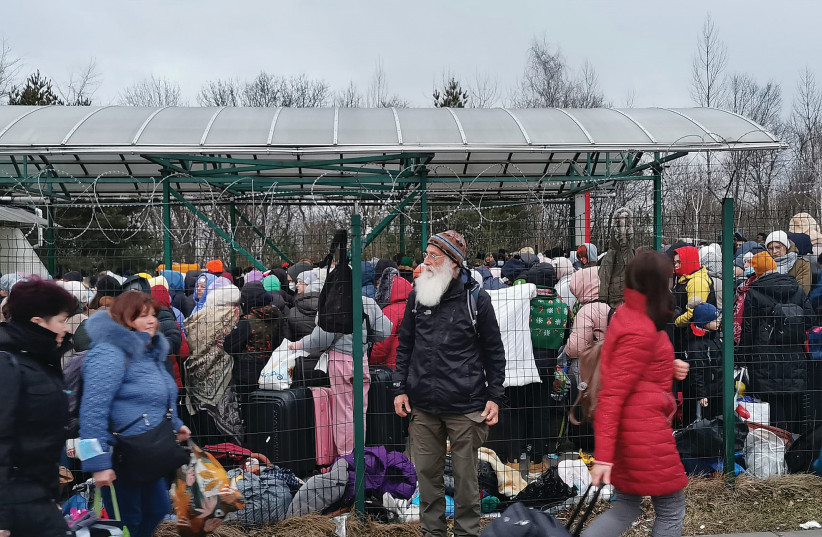Due to the violence, atrocities, and injustice of the invasion of Ukraine, over 13 million Ukrainians have been forcibly displaced. Despite the courage and resilience of the Ukrainian people, a mental health crisis is fast emerging in the wake of the crisis. Research has documented alarming rates of trauma and stress-related mental health problems among war-affected and forcibly displaced Ukrainians. The time to act is now.
Righting the injustice of forced displacement cannot be achieved without restoring the mental health of refugees and other forcibly displaced people. Likewise, now and for years to come, Ukrainian re-settlement and rebuilding will depend on such restorative social justice and healing. Accordingly, it is our ethical obligation to bring the most ambitious, rigorous, and compassionate clinical science possible to empower and support refugees in healing from the trauma and injustice of forced displacement. Thus, based on my team’s research during the past decade with traumatized refugees and asylum-seekers, the University of Haifa has launched a mental health initiative dedicated to war-affected and forcibly displaced Ukrainians – Moments of Refuge for Ukraine.
The initiative’s mission is to empower and enable war-affected and forcibly displaced Ukrainians to begin to heal and recover, and thereby to help prevent the destructive long-term consequences of forced displacement for families and communities. The initiative is part of the larger global Moments of Refuge Project – a science-based social impact initiative dedicated to the mental health of forcibly displaced people around the world. The project emerged from our decade-long partnership with trauma-affected African asylum-seeker communities who have sought safety and refuge in Israel. Through our collaboration with and study of these forcibly displaced communities in Israel, we learned that the sanctuary that forcibly displaced people seek, and need, entails more than the objective safety of a physical place to survive post-migration. To enable recovery, sanctuary post-displacement must also entail a subjective or felt sense of safety in one’s body and mind.
This led to the development of a mindfulness and compassion-based intervention program that is trauma-sensitive and socio-culturally adapted for diverse forcibly displaced people and post-displacement settings. Randomized clinical trial research has since established the program’s safety, efficacy, feasibility, and scalability the for even the most vulnerable forcibly displaced people (e.g. survivors of torture, human trafficking, and former child soldiers). Our research has documented that this therapeutic approach enables forcibly displaced people to experience moments of refuge and safety in their own minds and bodies in the short term, and thereby facilitates a process of recovery and healing in the long term. Uniquely, mindfulness-and-compassion training is designed to activate a pre-existing universal capacity for resilience, recovery and flourishing within individuals, families and communities. We have now adapted this intervention program to the conflict in Ukraine, in Ukrainian and Russian languages,
in order to reach and support war-affected and forcibly displaced Ukrainians worldwide.
The phases of Moments of Refuge for Ukraine

In the first phase of Moments of Refuge for Ukraine, in recent months, we have begun to deliver the intervention program through an online mobile digital platform. This approach ensures the broadest global reach and access of the program while providing maximal choice, flexibility, and geographic mobility for Ukrainians post-displacement. This approach also allows humanitarian aid, resettlement, and health organizations, as well as individual clinicians, to immediately deliver the program without the implementation barriers of training and certification. Importantly, the online platform includes a built-in capacity to conduct large-scale monitoring and evaluation of the program to enable optimization of its delivery and therapeutic impact. The digital platform thus has the capacity to reach and effectively impact the recovery of a limitless number of Ukrainians in need.
If successful, we plan to next roll-out our more intensive group-based intervention program, on the ground, within Ukrainian communities around the world. One innovative approach to addressing barriers to such community-embedded implementation involves integration, within existing and emerging technological systems. For example, we foresee implementing MBTR for groups of Ukrainians through the large global network of digital classrooms that has been established around the world to reach Ukrainian children. This existing community-embedded digital solution will, therefore, not only help connect groups of Ukrainians with instructors trained to deliver MBTR, but will also enable monitoring and evaluation to optimize program delivery and its therapeutic impact.
Moments of Refuge for Ukraine will empower and enable Ukrainians to cultivate moments of refuge and safety in their own bodies and minds, and thereby initiate a process of recovery from trauma and stress-related mental health outcomes of conflict and forced displacement. Our science-based social impact initiate is therefore designed to prevent the destructive consequences of conflict and forced displacement for individual health (e.g. suicide), for families (e.g. intimate-partner violence), for children (e.g. inter-generational transmission of trauma and stress), and for Ukrainian communities (e.g. fragmentation of community resilience and social capital). In so doing, the initiative is also designed to amplify the impact of resettlement, rebuilding, and social justice policies and programs for Ukrainians post-displacement and post-conflict.
It is important to remember that the Ukrainian people are among more than 100 million people who are forcibly displaced around the world today. This number has doubled in the past decade alone and is projected to grow exponentially in the coming decades, due to rapid climate change. We hope that The Moments of Refuge Project can be part of global collective action in pursuit of restorative social justice and healing for forcibly displaced people around the world.
Amit Bernstein, PhD, is a Professor of Clinical Psychology, and Director of the Observing Minds Lab and the Moments of Refuge project at University of Haifa. Moments of Refuge for Ukraine is a collaborative project between Moments of Refuge project team at University of Haifa, leaders of the Ukrainian refugee community, Global Empowerment Mission, Pandemic of Love, the Ukrainian Mindful Awareness Project, Mindful.org, Smartaid, BStrong, and TeleHelpUkraine. Dr. Bernstein can be reached at abernstein@psy.haifa.ac.il
